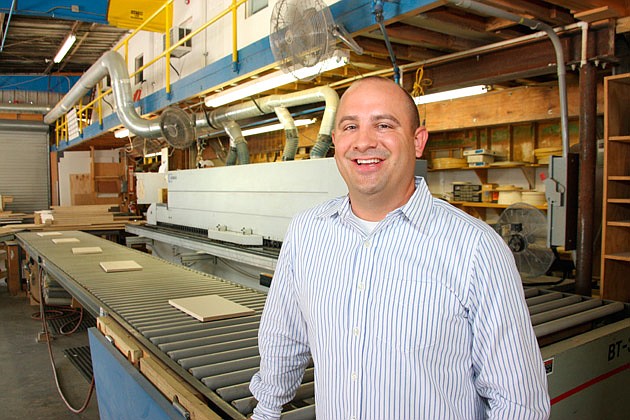- November 26, 2024
-
-
Loading

Loading

Adams Group's facility near the airport in Punta Gorda is like a woodworking shop on steroids, with giant computerized saws and wood planks stacked to the ceiling.
But while it hasn't been immune from the construction downturn, the family owned and operated company has the advantage of working in a rarefied world with few competitors. This has allowed Adams' saws to keep humming.
That's because the company, which builds counters, desks and cabinets for large corporate and government customers, has $16 million in bonding capacity. It's a form of insurance built up over years of success that gives large corporate and government customers confidence that Adams can finish large jobs.
Only a dozen competitors in their casework field have that level of bonding capacity, says Ethan Adams, the 29-year-old vice president and son of company owner Joel Adams, who oversees the firm's daily operations. Without it, competitors can't bid on large jobs to build thousands of desks in schools or wood-paneled courtrooms in new judicial buildings
Adams has its roots in residential cabinetry, working in homes in Pine and Useppa islands in Lee County in the early 1980s. But the company expanded into commercial work 15 years ago, riding the corporate and government construction boom that followed the population growth.
For much of that time, Adams had enough work on the Gulf Coast and didn't have to expand geographically. And it grew without taking on more debt than it could repay immediately. “We're one of the biggest in the state,” says Adams. The company reported $15.5 million in revenues in 2008, up 3.3% from 2007.
Because of its size, Adams can get more favorable terms from its vendors and its bids can be more competitive than smaller rivals, Adams says.
However, Adams expects revenues to drop to $12 million this year because of the drop in corporate work and it has cut its staff to 60 people, down from 110 employees. Anticipating the downturn, Adams expanded its reach into other Southeastern states from Texas to the Carolinas. “It's only recently we expanded because it was so good here,” Adams says.
Adams has invested $750,000 in new equipment since the end of 2007 and has instituted lean-manufacturing processes and just-in-time delivery of materials over the last four years. In 2008, it won a $30,000 grant from the state to help train employees on the new equipment. All these efforts are paying off today because Adams estimates the plant is 30% more efficient than it used to be.
It also changed its name to Adams Group from Adams Brothers Cabinetry, shedding the mom-and-pop name for a more corporate identity.
“Cabinetry was pigeon-holing us,” says Adams. It's also adopted the green mantra to comply with government-building mandates, only buying wood from trees that have been harvested in well-managed forests.
Government and schoolwork now represents about 40% of Adams' revenues. Depending on whether corporations will start expanding again, the company's share of government work may grow. In particular, government agencies such as the U.S. Department of Veterans Affairs are building new hospitals, Indian tribes are building casinos and sports teams are building new stadiums.
Adams has mixed views of the government stimulus. It may help in the short term with new building projects, but a government-construction boom may put inflation pressure on wages and materials, affecting the company's profits.
Adams is keeping an eye on the stock market and sees hopeful signs in the recent gains.
“The stock market really affects our business,” Adams says. When the market rises, so do corporate expansions. When it falls, projects get shelved, he says.
“The stock market is really an indicator of our work,” he says.